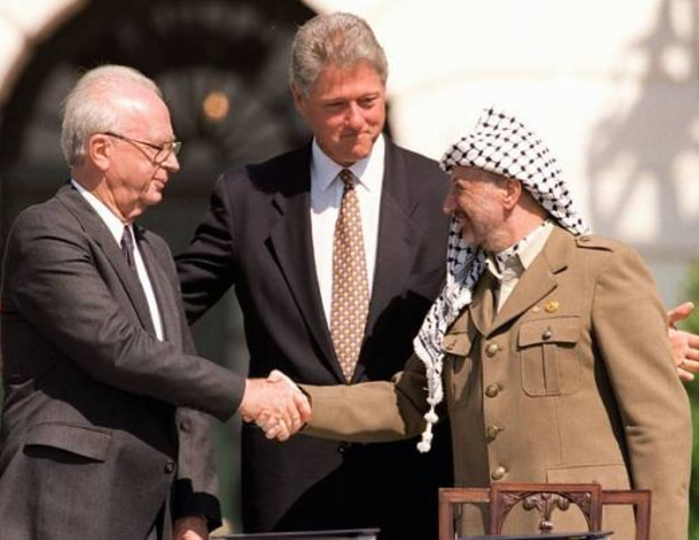Any informed discussion on the correlation between terrorism and Israeli-Palestinian peace negotiations should emphasise the following dates: July 2000, September 2000, and January 2001.
In July 2000, Yasser Arafat turned down a peace offer by Ehud Barak that would have created, for the first time in history, a sovereign Palestinian state.
In September 2000, Palestinians launched what became known as the 2nd Intifada, a five year campaign of sadistic violence that killed over 1,000 Israelis, mostly civilians, and maimed thousands more.
In January 2001, Barak, despite the outbreak of terror several months earlier, continued to participate in the US-led talks, only to see his more generous peace offer again turned down by Arafat.
So, what’s the take-away from this timeline, which shows that a monstrous campaign of Palestinian violence was bookended by sincere Israeli overtures for peace?
At the very least, it should serve as an important illustration of why there’s little if any evidence that Palestinians ‘resort’ to terror when there’s no hope for peace and two states. Otherwise, why did the 2nd Intifada begin during a period when the chances that a Palestinian state was going to be created was at its pinnacle?
Predictably, recent articles in British media outlets about the recent surge in Palestinian terror didn’t pause do even briefly meditate upon this vexing, narrative-contradicting question.
A Telegraph editorial (Mid-East On Knife’s Edge”, Jan. 30) focused on fears of increased violence and instability in the region after a Palestinian terrorist murdered seven Israeli civilians on Friday, before adding, “The absence of any moves towards a political settlement of the age-old dispute is encouraging young Palestinians to listen to those fomenting trouble“.
In The Times, Anshel Pfeffer (“Does deadly week in Israel raise prospect of Third Intifada?”, Jan. 29) concluded his piece by asserting that “a new Palestinian generation has grown without hope. They have little to lose from launching a new [Intifada].
And, in an analysis in November on the increased violence, Financial Times Jerusalem correspondent James Shotter (“Upsurge in violence heightens anxiety over stability of West Bank”, Nov 23) explained the rise of the Lion Den’s terror group thusly:
Officials in Nablus said other broader factors were also at play: anger at Israel’s 55-year occupation, and the coming of age of a generation too young to remember the 1990s Oslo Accords, which briefly raised hopes of a resolution to the conflict and an independent Palestinian state.
The implication of Shotter’s take is that during times when there is hope of a peaceful resolution to the conflict, the Palestinian appetite for terror will wane – a correlation that is wishcasting at best, and, as we showed regarding the 2nd Intifada, is not supported by the events of the late 90s and early to mid 2000s.
The generation that participated in the terror of the 2000s was the Oslo generation – those who not only saw their leader shaking hands with Yitzhak Rabin, but experienced the fruits of negotiations in the form of IDF withdrawals from large swaths of the West Bank, and PA control of major Palestinian population centers. Those Palestinians of course also saw Israel’s 2005 withdrawal from Gaza, a unilateral concession that resulted in the rise of an Islamist extremist group committed to Israel’s annihilation.
None of this is to suggest that peace negotiations between the two sides aren’t extremely important. It’s meant to emphasise the absolute folly – given the last thirty years of Israeli-Palestinian history – of concluding that despair over the absence of a diplomatic horizon is what drives otherwise normal people to murder innocent men, women and children at restaurants, bus stops, and even outside Jewish houses of worship.




